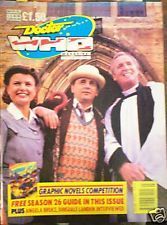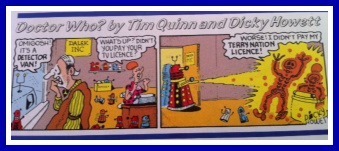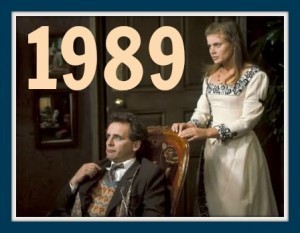DWM Keeps the Faith in The Wilderness Year [WHO-50—1990]
 The 1990’s were an important era for me as a Doctor Who fan. They represent my teen and early adult years, when I was building on my fannish love.
The 1990’s were an important era for me as a Doctor Who fan. They represent my teen and early adult years, when I was building on my fannish love.
This decade – and in fact the entire period from 1990-2004 (with a brief holiday in 1996) is often referred to as ‘the Wilderness Years,’ coined by the team who worked on the eternal Doctor Who Magazine during this era and feel the need (quite rightfully) to point out their valiant efforts in maintaining a quality media tie in publication without a regular show to support. For more than a decade.
In truth, the 90’s were full of Doctor Who – just as the Target novelisations came to a natural end, the VHS releases of classic stories took off with a vengeance, bringing new audiences to old stories. The original series of adult New Adventures and Missing Adventures novels began in 1991 and produced an enormous quantity of stories over the next six years, only to be replaced by the similar-but-different BBC Book range of Eighth Doctor Adventures and Past Doctor Adventures which continued well into the new Millennium. There were comics and radio productions (okay not many, but some). Here in Australia we had even Doctor Who repeats on the ABC, often in the crazy early hours, which gave me the opportunity to see some Fifth and Sixth Doctor stories for the first time ever.
So yes, there was a lot happening with Doctor Who in this decade, but a lot of it hadn’t started yet in 1990. I freely admit that this at least was a Wilderness Year, though for many it wasn’t entirely clear that Doctor Who had in fact ended…
As it happens I have two 1990 issues of Doctor Who to hand and can give you the scoop on what (if anything) was going on with Doctor Who in the Wilderness Year. A time capsule into the past! (Cue wobbly wobbly flashback effect)
 DOCTOR WHO MAGAZINE No. 159 £1.50
DOCTOR WHO MAGAZINE No. 159 £1.50
April 1990
Cover: a photograph of Sophie Aldred, Sylvester McCoy and Nicholas Parsons in costume for The Curse of Fenric.
Cover Text: GRAPHIC NOVELS COMPETITION/FREE SEASON 26 GUIDE IN THIS ISSUE/PLUS: ANGELA BRUCE, DINSDALE LANDEN INTERVIEWED.
Editor: John Freeman.
Editorial: A response to Worlds of the Imperium, a book by Keith Laumer featuring the idea of time parallels, and a theory that not all Doctor Who adventures take place in the same continuity.
Gallifrey Guardian:
BBC DILLY DALLIES.
No final decision had been made on the future of Doctor Who at the beginning of February. The BBC are still keeping all options open in finding a format that will take Doctor Who into the Nineties and keep it going for the next ten years. Head of BBC Drama Serials Peter Cregeen’s only new comment on the future was “There will be more changes than people think…” Something to ponder. If the programme remains in-house production may start as early as July this year…
BEYOND THE TARDIS:
Jon Pertwee provides voices for the thirteen part series of SuperTed which began on BBC1 on January 8th.
Tom Baker has been busy recently, completing an interactive video for children on road safety for the Department of Transport, in addition to recording Hyperworld with Douglas Adams for the BBC. He’s also co-presenting Boom! A new Channel 4 magazine format series from Ragdoll productions.
Peter Davison’s second series of Campion began on January 12th on BBC 1.
Louise Jameson’s final Bergerac appearance was in the season opener on January 14th, when she was murdered in A True Detective.
Video View:
With an announcement still awaited on the future of Doctor Who, the BBC have at least scheduled the release of more of the Time Lord’s stories on video. Las month An Unearthly Child, the first ever Doctor Who story, and The War Games, Partick Troughton’s final regular story as the Second Doctor went on sale. This brings the total number of stories available on tape to fourteen.
Interview with Angela Bruce from Battlefield:
DWM: The Brigadier first appeared in 1968, twenty-one years ago. Can you see yourself coming back in 21 years time and playing Brigadier Bambera?
ANGELA: I’d love to, it’s such a hoot, especially to be paid to have so much fun! It was very professional, though… When Ben (Aaronovitch) wrote the character he made it so she could come back like Nick’s Brigadier.
Comic Strip: Train Flight Episode One – Sarah Jane Smith meets the Seventh Doctor! (She insists they take the tube instead of the TARDIS to the jazz concert they want to attend, and of course the train itself ends up hurtling through a space vortex…)
Letters Column, YOU ON WHO – mostly this month responding to a previous issue reporting that Terry Nation and Gerry Davis (creators of the Daleks and Cybermen respectively) were bidding to bring back Doctor Who as an American co-production.
“They say they want to maintain the ‘British flavour… but add the pace and action of American TV drama’,” writes Nathan Cooke of Fairfield, Stockton-on-Tees. “What does this mean? MacGyver in space with British accents?”
“An Anglo-American co-production is the worse (sic) that could happen,” writes Matthew McLean from Basingstoke. “Worse than complete cancellation.”
But wait, there’s more! DOCTOR WHO MAGAZINE No. 166 £1.50
DOCTOR WHO MAGAZINE No. 166 £1.50
October 1990
Cover: a glamour shot of Nicola Bryant
Cover Text: INSIDE: NICOLA BRYANT/ Making Mawdryn Undead/DERRICK SHERWIN ON U.N.I.T./CURSE OF FENRIC VIDEO COMPETITION INSIDE
Editor: John Freeman.
Editorial: How exactly does the Master fund all of his Earth invasions?
Gallifrey Guardian:
GRAHAM WILLIAMS DIES
Former Doctor Who producer Graham Williams died in August, the result of an accident at home. Graham produced Doctor Who from 1976 to 1979 and is perhaps best known for the introduction of the Doctor’s mechanical companion, K9. However, he also produced the Key to Time Season, the first with an overall theme, which saw the first appearance of th Black and White Guardian. He cast both versions of Romana – Mary Tamm and Lalla Ward – and,most importantly, he secured the continuation of the programme in the face of fierce criticism at its levels of violence and horror.
PROGRAMME’S FUTURE STILL UNDECIDED.
As DWM went to press at the beginning of September, we learnt that four drama series have definitely been commissioned by the BBC for 1990 production. None of these are Doctor Who. If a decision was not announced in September, sources close to the programme said “Start worrying.” Sylvester McCoy, speaking at the TARDISin Durham convention, said he’d been told the programme made over five million pounds a year for the BBC. “If this is true, someone should tell the BBC accountants how much they’re losing by not making the show,” he added. Doctor Who Appreciation Society officials said a letter writing campaign would be considered if a decision was delayed still further.
The Doctor Who office officially closed on August 31st and John Nathan-Turner ended his tenure as Producer on the same day.
Controversy Corner: Richard Landen talks about the shocking inconsistencies of Doctor Who canon found in Target novelisations as opposed to the broadcast TV episodes, and tries to use logic to compare ‘regeneration’ vs. ‘rejuvenation.’
A Violent End: DWM tracked down Nicola Bryant to find out how she’s found life after Who. Very well, it seems…
Comic Strip: Fellow Travellers Part 3, scripted by Andrew Cartmel.
Letters Column, YOU ON WHO:
“I hope the BBC will consider bringing back old foes in Season Twenty-Seven,” says Peter Webber of Exeter.
Meanwhile, sixteen-year-old Tony Darbyshire of Wigan complains at the ‘Nostalgia’ articles in the magazine being ageist, as his Doctor Who memories start with City of Death and he can’t be expected to know anything about the Hartnell, Troughton or Pertwee years. Ahhh, fan entitlement, don’t ever change.
ELSEWHERE ON 1990:
Sorry, I got nothing.
PREVIOUSLY:
Or check out my overviews of WHO-50 posts on Doctor Who in the 1960′s, the 1970′s and 1980′s.





